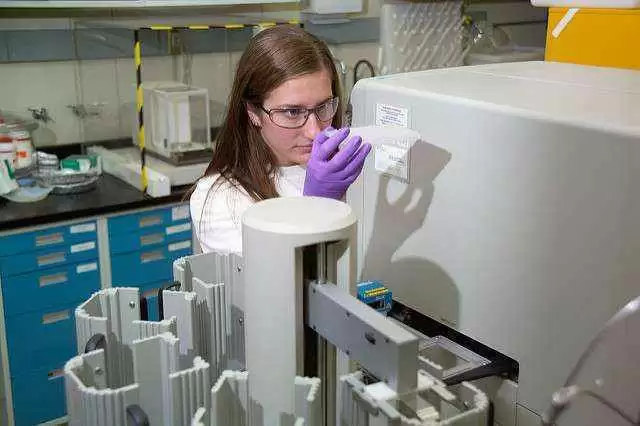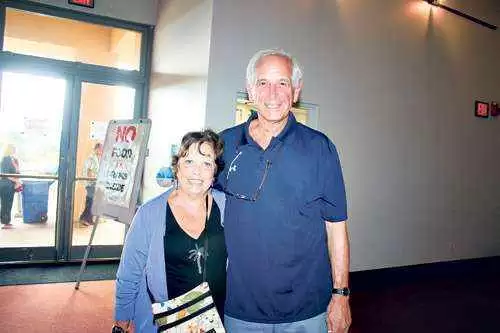
Celiac.com 06/20/2016 - One evening in October 1999, while in my academic office at Open Original Shared Link, my professional and personal life changed in an instant. I had recently had the idea of testing stool for gluten sensitivity to possibly prove that patients with microscopic colitis, whom displayed an epidemiologic, pathologic, and genetic overlap with celiac disease but who rarely had positive blood tests against gluten (because they rarely had the small bowel villous atrophy of celiac disease; they had colitis which is inflammation in the colon). I had remembered that previous researchers in Scotland invasively placing tubes into certain patients without villous atrophy had been able to find antibodies to gluten deep inside the small intestine when they were absent from the blood. They called these patients latent celiacs. However, they never reported results of testing stool, which would have been a lot easier to collect because it did not require the multiple hours and patient invasion of placing tubes deep inside the intestine.
That October afternoon I received the first set of results from my laboratory of a newly improved method we had developed for testing stool for the presence of antigliadin IgA, the main antibody against wheat gluten. It was about 7:00PM, it was dark outside, and late enough in the office for everyone to have gone home, allowing me a quiet setting to review these results. What I saw that night seemed like a window into the future and a medical-scientific Pandora's box, all at the same time. Not only did I see that about 75% of the microscopic colitis patients had a positive fecal antigliadin test but 25% of asymptomatic volunteers did also. I quickly did the math, and realized that celiac disease at a prevalence of even 1% would pale in comparison to these statistics, revealing that hundreds of thousands of people in the US and the world may be gluten sensitive without having celiac disease. I knew that I had just been given information that no one else in the world knew, and that it would likely have major public health implications resulting from a new dietary-induced disease paradigm. That the main staple food of Western civilization may be causing large percentages of the population to have symptoms and syndromes, not only colitis, but perhaps also irritable bowel syndrome, autoimmune syndromes, short stature in children, multiple allergies and chemical sensitivities, and even idiopathic psycho-neurologic syndromes like depression, Parkinson's Disease or Lou Gehrig's disease. Not to mention what it might mean for me as the holder of this information.
Celiac.com Sponsor (A12):
Then it happened—the most significant moment of my life up to that point—it felt like someone had tapped me on my left shoulder. Though I knew I was alone in the office, I turned to the left and looked upward for some reason for what or whom might have tapped me on my shoulder. And though, while I saw no one there, I immediately knew there was a presence with me at that moment, a spiritual or angelic presence. And then I heard these words in my head "You have to leave this place". And within minutes, the decision came to me that I indeed did have to leave my academic post of 15 years to bring the results of this new fecal testing method to the public: to the 25% of otherwise asymptomatic people reacting to dietary gluten with the same immunologic reaction measured in celiac disease, antigliadin antibody, as well as to the 75% of patients with microscopic colitis and perhaps other GI ailments and syndromes who, with a gluten-free diet, might heal their chronic refractory inflammatory bowel conditions.
This was a bold line of thinking for me, as I had been on a professional trajectory toward the normal milestones of a successful young academic medicine career, becoming head of a sub-specialty medical department (for me, Gastroenterology), the prospects for which had just begun to surface in my life. Yet, I had just been called it seemed, by an encounter with a supernatural force, to an assignment of sorts with a mission to fulfill. And so, the idea of creating a specialty intestinal laboratory to make this new line of testing available to those in need of its benefits was born, EnteroLab.com (entero means intestine in Greek and in medical terminology). A "dot com" I thought? Yes, this form of testing should originate "in the comfort of your own home". Why make people with GI problems fly on an airplane half way across the country merely to give stool specimens for lab analysis (the practice of my Dallas hospital for decades up until that time). If I could create a mechanism whereby only the specimens but not the person could do the flying, then we could deliver results and follow-up dietary recommendations electronically, and the healing would begin shortly thereafter with dietary elimination of the causative antigenic foods. And if the client desired, they could have a paid phone consult with me or my nurse and still not have to spend the time, money, and difficulty flying to Dallas. And I have to admit, in 2000 it was kind of exciting to be the first doctor in the world to turn his entire medical career over to the internet, as well as to have created the first clinical laboratory serving people directly without the need of a prescription or previous doctor's visit, both incredibly bold and revolutionary ideas at the time (and perhaps still).
I had learned from similar major paradigm shifts in my field of gastroenterology (specifically, in 1983 when doctors in Australia found in their research that ulcers might be caused by bacteria, but whom were laughed at and ignored for about 15 years, yet later in 2005 received a Nobel prize) that it would likely take 15-20 years before anyone in the medical field would believe my new research findings relating to non-celiac gluten sensitivity and its simple diagnosis with fecal testing. This, even though I was regarded even at my young age as an expert in the field, with a significant track record for developing unique and successful ideas for diagnosis and treatment of GI diseases (see my CV at www.intestinalhealth.org/CV), and having been trained by one of the most successful and respected gastroenterologists of all time, Dr. John Fordtran. While my medical peers might not believe my results for some time, people suffering the symptoms would not care whether or not it was too soon for a scientific paradigm to shift, because they would want to try a gluten-free diet to get better. And try, they did. Following positive stool test results from EnteroLab, they got better in droves going gluten-free, and in most cases with complete healing of long-standing symptoms and syndromes. And eventually I predicted, with such remarkable improvements that had never been possible before, their health practitioners (at least the honest, inquisitive, and non-egotistical ones) would ask them what had brought on such improvement. Eventually these practitioners would begin sending other patients for the same testing that had opened the door to the dietary miracle the gluten-free diet posed for those previously tested.
Beyond the consequences of having to leave my academic positions and stature behind, I had to withstand some public and more often professional criticism for undertaking a bold and somewhat maverick professional move without the permission of my peers in doing so. This does not always go over smoothly in scientific and medical professional circles. Despite having been a highly respected young published researcher at that time (40 publications by the time I was in my mid-30's), my submissions both to professional GI society meetings and GI journals (journals that I had served as a reviewer for years) were rejecting my research submissions relating to this new paradigm of non-celiac gluten sensitivity. And it seemed, the rejections were not for objective reasons, but more subjective and for principle. Other researchers in this specific field and other fields have had to endure similar treatment. Sadly, submissions to these journals addressing paradigm-shifting topics are not always reviewed in unbiased, objective ways if they deal with a subject or contain conclusions that go against what the reviewers inherently believe to be true at that time (the "I'll see it when I believe it" scenario rather than "I'll believe it when I see it"). And yet, despite submissions of excellently performed and written studies that were rejected for these reasons by a system that seemed unready for this new paradigm, the most common public and professional criticisms of my methods primarily centered around my "lack of publication". This seemed circular and nonsensical to me. After all, had Michael Dell ever published his methods of making computers delivered in a revolutionary way (mail order) to its customers? These computers worked and served its customers well without a published method? Why is lack of publication of a medical technologic method equated with lack of Truth or efficacy? My response was and still is to remain true to my own data and experience, and my desire to serve and help people, and to not proceed according to the needs and critical dictates of others having no experience with my techniques.
And so, 15 years later, as EnteroLab approaches our millionth patient tested, and with the current number of referring health practitioners in excess of 1,500, EnteroLab.com stands as a successful purveyor of medical Truth and public service. I ask people "How could hundreds of thousands of people be satisfactorily served over 15 years if what we are doing was not worthy and True?"; at some point, a person's or business' track record has got to stand for something positive and meaningful. And it seems my estimate of the time it would take for other researchers or mainstream practitioners to begin getting on board with the new paradigm was correct. Non-celiac gluten sensitivity has recently been further researched and substantiated to exist, just as I reported in public and professional lectures as early as 1999 (but published by others as early as 1980). And it has only been in the last 2 years or so that I have seen the question being raised at national and international GI meetings by "celiac researchers", but at least they are now doing so. Yet, the public has been the patron of the paradigm all along. In the last 4-5 years gluten-free food companies have carried the ball farther down the field than ever before. Yet interestingly, this focus on the food has mistakenly led people to regard this serious clinical syndrome as "a diet" not a disorder. And as we all know, "diets" come and go for people, even week to week. This is not healthful for any diet, but especially not for a gluten-free diet where the immune system can be hyperstimulated by repeatedly withdrawing and reintroducing such an immunogenic food. And yet, whether or not people choose to test for the syndrome with our stool test (the only test available to sensitively detect non-celiac gluten sensitivity), if they decide to go gluten-free, that must be a lifelong dietary decision. Otherwise, the test should be employed to help determine how serious the circumstances might be, and to further reinforce the clinical need of its permanency. Because after all, 25% of people, even when asymptomatic, have detectable immune reactions to gluten, and in many of these, damage to the intestine can be detected as well (measurable by EnteroLab from a fecal fat test from the same stool specimen).
We have stood firm on the Truth of our research and clinical results, patiently waiting these 15 years for the public and professional paradigm-thinking to catch up. And catch up it has. Everyone today has at least heard about gluten, and people are not called crazy because going gluten-free makes them better physically, mentally and/or emotionally. But our work is not done. There are many millions more children and adults suffering not only from gluten sensitivity, but from other food sensitivities as well, and other diet-related maladies (obesity, endocrine problems including diabetes, eating disorders, food addictions, etc.). I am appreciative of the support and respect given to me and EnteroLab by Celiac.com and its founder, Scott Adams, who also knew early on there was something real about gluten sensitivity. His 14 year old "Journal of Gluten Sensitivity" is evidence of that.
And so now, we are proud to partner with Celiac.com by allowing them to be the first company outside our own to offer our proprietary EnteroLab tests for sale, having created some special gluten-oriented testing panels for them. And as we go into the next decades of service, I leave you with a hint of the next, new paradigm… which is really the old paradigm. Gluten sensitivity is not limited to wheat, barley, and rye, but often includes oats as well (not just because of wheat contamination of the oats). This was the clinical standard from its beginning by the founder of the gluten-free diet, Dr. Willem Dicke, but that got changed in the last 10-15 years by substandard research methods based only on celiac disease as the end point and bias toward wanting to find such a result (all studies contain bias by the researchers, it's the nature of the mind influencing reality). So for the first time anywhere, we are using a diagnostic test for non-celiac oat sensitivity, and showing that about 50% of people reacting to wheat, barley, and rye, also react to oats with a similar immunologic reaction detectable in stool. But more on this as the information and paradigm-acceptance develops. Hopefully, this one won't take another 15 years to be accepted.
We at EnteroLab and my non-profit public educational institute, The Intestinal Health Institute (www.IntestinalHealth.org), have been greatly honored to serve all our patrons to date, and we look forward to meeting and serving more of you in the future. For more information on testing at EnteroLab.com, please call 972-686-6869 or go to Open Original Shared Link. Thank you for reading this historic account.












Recommended Comments
Create an account or sign in to comment
You need to be a member in order to leave a comment
Create an account
Sign up for a new account in our community. It's easy!
Register a new accountSign in
Already have an account? Sign in here.
Sign In Now